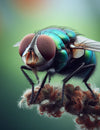
In many households, especially those in tropical regions, the presence of lizards is a familiar sight. While some might consider them unwelcome intruders, others appreciate their role as natural pest controllers. However, numerous myths about home lizards persist, shaping perceptions about their behavior and characteristics. In this article, we aim to dispel five prevalent misconceptions about these creatures, addressing concerns such as whether lizards are poisonous or dangerous.
Myth #1: Are Lizards Poisonous?
A widely held belief is that home lizards are poisonous. This misconception often arises from confusion with venomous reptiles like snakes or certain frogs. It's crucial to clarify that home lizards are not poisonous and do not possess venom. They are entirely harmless to humans and pets, posing no threat to health. While some lizard species in the wild may have developed toxins for defense, such species are not commonly found in homes. Hence, having a home lizard poses no risk of poisoning.
Myth #2: Can Home Lizards Transmit Diseases?
There's a concern among some individuals that home lizards can transmit diseases. While certain lizard species may carry bacteria or parasites with the potential to cause illnesses, the risk can be minimized through good hygiene practices and maintaining a clean home. Not all home lizards are disease carriers, and the likelihood of transmission varies by species and environment. It's advisable to exercise caution and take appropriate measures to reduce any potential risks associated with handling or cleaning up after lizards.
Myth #3: Are Home Lizards Dangerous?
Another prevalent myth suggests that home lizards are aggressive and prone to attacking humans. While certain lizard species, like monitor lizards, can be aggressive, most lizards found in homes are not inclined to attack humans. In reality, they are often timid and more likely to flee if they feel threatened. Proper handling and respecting their space can foster peaceful coexistence between home lizards and humans.
Myth #4: Are Home Lizards Pests?
Some mistakenly label home lizards as pests, similar to rodents or insects, capable of causing damage to homes. Contrary to this belief, lizards do not actively seek to damage property. Instead, they can be beneficial, helping control insect populations such as mosquitoes and flies. Many lizard species are harmless and pose no threat to humans or pets. Distinguishing between actual pests and harmless creatures like home lizards is crucial to appreciate the ecological benefits they offer.
Myth #5: Is It Difficult to Get Rid of Home Lizards?
A common misconception is that once home lizards enter, they are challenging to remove. However, various methods, including the use of lizard repellent sprays, can be effective. These sprays, typically made from natural ingredients, emit scents that lizards find unpleasant, deterring them from treated areas. Caution is advised when using these sprays, following the manufacturer's instructions to prevent harm to both humans and lizards. Overall, it's essential to recognize that home lizards are not inherently dangerous or aggressive, and with preventive measures, coexistence is possible.
In conclusion, home lizards are harmless and beneficial additions to your living space. Dispelling these myths is crucial for fostering a better understanding of these creatures. Rather than panicking or attempting to eliminate them, embracing their presence allows for a harmonious coexistence and appreciation of the advantages they bring to your home.




In India also a lizard had fallen in milk It was a desert in wedding so 29 people has dead
What is the answer to the question that a whole family died because of the food they ate confirmed that it was lizard that fall in thier food
Izard are fall in food to cooked any option ?
Then why food cooked with lizard getting vomiting and causing death some times